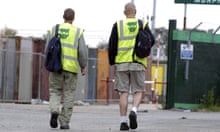It was the morning after the EU referendum and Aneta Duchniak wondered if she would have many British customers. Two years ago, she opened Duchniak’s, the first Polish restaurant in Wakefield. The West Yorkshire town voted by a margin of 66.3% to leave the EU. Many of her regulars are Yorkshire folk who have taken a shine to her delicate pierogi dumplings and hearty borscht soups. Many of them wanted Britain to leave Europe, she says, and yet they made a special effort to come in afterwards to tell her it wasn’t personal.
“They said, ‘We want to support you, it’s nothing against you, it’s against Brussels controlling us,’” she recalls. “Lots of my regulars voted to leave. One of them even told me she has a Polish cleaner. Roger, who comes in all the time for a cup of tea, voted out and he says he worked with lots of Polish people when he was a miner.”
The government estimates there are 984,000 Polish nationals living in Britain – an increase of 141,000 on 2014’s figures. Unlike other immigrant communities, the Poles are well spread out across the country, with Polish food shops popping up everywhere from Inverness to the Isle of Wight. By local council estimates, as many as 10,000 are now settled in Wakefield, which is home to various Polish beauty parlours and hairdressers, estate agents, off-licences, dentists and doctors and a string of Polish delis set up by enterprising Kurds. One night last month, the Tequila club on Westgate was advertising “Disco Polo Night Sexy Friday”. It appeared to be some sort of dubious hookup night where revellers were given coloured wristbands to indicate if they were “szukam” (looking), “skok w bok” (up for a fling) or “zajęta” (taken).
In the 12 years since Poland joined the EU, the earliest arrivals to Wakefield now speak with broad Yorkshire accents, such as Agnieszka Piekarz, who moved to the UK in January 2006, aged 19. She has spent the last decade working her way up the career ladder, starting in a freezing-cold meatpacking factory, taking in stints as a picker and packer and in office admin, and ending with her dream job as a head chef in a hotel.
Piekarz – whose sister Anna Warecka recently moved from Germany to Wakefield to work at Duchniak’s – delights in British life, particularly what she calls “your shortcut words”. She likes how “thank you” becomes “ta” – “and Darren becomes Daz and Gavin becomes Gaz”. But what she loves most is British food. “I love making pies and I love eating pies,” she says, “and I love Sunday dinners and English breakfasts.”
She is now better at cooking British food than her native Polish cuisine, and has no intention of returning home. After a decade in Britain , he is firmly woven into British life, with her son enrolled at a local primary school and many British friends.
It was the year Piekarz arrived in Britain that many first noticed that people like her were suddenly serving our coffee and renting houses on our streets. Had anyone else’s corner shop turned into a Polski sklep, a colleague wondered, 10 years ago. Who else had employed a Polish plumber? And who had tried Żubrówka, that lethal vodka with the bison grass in it, which could now be bought at every off-licence?

When Poland joined the EU in May 2004 – along with Cyprus, the Czech Republic, Estonia, Hungary, Latvia, Lithuania, Malta, Slovakia and Slovenia – there was little fear or fanfare about what their membership could mean for Britain. The government certainly wasn’t worried. Tony Blair’s administration estimated that no more than 13,000 of these new Europeans would seek a new life in Britain each year from 2004. They were using a prediction made by Christian Dustmann, an academic at University College London, which worked on the (incorrect) assumption that other large countries in the EU, in particular Germany, would also open up their labour markets.
It soon became clear that Dustmann’s estimate was hilariously – or catastrophically, depending on your view – wrong. Between May 2004 and June 2007, 430,000 Poles applied to the Home Office worker registration scheme, joining the 69,000 Poles already in Britain, pre-EU enlargement. As the scheme was voluntary, the true figure was thought to be much higher. In July 2006, the respected Polish newspaper Polityka estimated that 1 million Poles had moved to the UK.
It was this last figure that prompted the Guardian to produce a special edition welcoming what we called a “benign invasion” of eager and biddable Poles to our rainy island. That and a desire to counteract stories in the rightwing press about Poles eating swans and koi carp from Britain’s ponds, and Polish labourers bedding down in portable toilets to save on rent. So, for one day only, the Guardian’s newspaper masthead was in Polish and we published a whole spread in G2 po polsku, which aimed to answer all the questions Poles might have about British life but were too afraid to ask, such as: why do your sinks have two taps? Why do you wear so little on a night out? And where are your plumbers?

But for how much longer will the UK be a favoured destination for Poles seeking adventure or a new life? Germany is now officially the No 1 spot for Polish expats, since Angela Merkel lifted restrictions on access to the labour market in 2011, according to Poland’s ambassador to Britain, Arkady Rzegocki. “The United Kingdom was, with Ireland, the first place to allow Poles to work but for the last four years Germany has been the top destination, because Poles can now work there,” he says.
Poland’s conservative government is also on a drive to encourage its expats to return home and have babies, says Rzegocki. He cited a new child benefit programme called 500+ which gives Polish families a monthly allowance of 500 złoty (about £100) for all second and subsequent children up to the age of 18, including those already born.
Kamil Moczyński, a dentist in Wakefield since 2010, said the benefits for Britain of Polish immigration had been clear, particularly the “very high number of university-educated migrants like doctors, nurses, IT specialists, architects and others”.
Poland has benefited, too, he says, noting that even on the minimum wage in Britain, Polish workers can save money to send home to poorer relatives; but Polish society has suffered greatly, and not just from the extreme shortage of qualified workers in some areas.
“Can you imagine the situation that at least one person from almost every Polish family lives and works in the UK? Men left their wives and children, speak with them on Skype and visit them once, sometimes twice, a year. It’s also quite common that both parents move and leave their young children with grandparents for a few months, sometimes even years. If they had another choice they would never move. For many Polish families, immigration is the biggest tragedy in their lives and they have no choice.”
Moczynski never intended to stay long but seven years on, he has bought a house, started a family and applied for British citizenship. He has not suffered any abuse post-referendum, but thinks it is “just a matter of time. Unfortunately, incidents of xenophobic abuse directed against Poles are common and rarely reported. After Brexit, many immigrants feel unwelcome and unsafe.”
It was big news in Poland last month when two Polish officers were deployed on the streets of Harlow following the murder of Arkadiusz Jóźwik, 39, who was beaten to death in the Essex town in a suspected racially motivated killing. At a vigil for Jozwik, two Polish men were assaulted. Such xenophobic brutality is hardly the best advert for moving to Britain – especially when combined with the racist graffiti sprayed on Posk, the long-standing Polish Cultural Centre in west London, and the laminated cards reading “Leave the EU – no more Polish vermin” reportedly delivered to Polish people in Huntingdon, north-west of Cambridge. For many Poles, the Brexit vote was a horrible wakeup call. Julita Festejo, who wrote a piece in the original Polish edition, says: “ I felt like I was a part of a David Lynch movie; the perfect version of my life, which is finally seen for what it is really was – a lie, a nightmare. It felt personal. Brexit was an anti-immigration vote – a vote against me.”
In July, one of the few Poles to be elected to public office in the UK quit. In an open letter given to the local paper, Mariusz Waluk, who had served on Penrith council over the past year and employs 15 people in his elderly care company locally, cited animosity towards Europeans post-Brexit as one reason for his departure from local politics.
He wrote: “My decision was finalised after the Brexit vote, when comments arose from various leave supporters who expressed disappointment that all foreigners were not being made to leave the very next day, and similar sentiments.
“I have lived in the UK for more than 10 years now and currently work with English, Scottish, Irish and French nationalities and, as such, hope other people can grow to understand that race, religion or creed pale into insignificance against strength of character and a genuine, honest and hard-working personality.”
It was a dismaying signoff. Yet many academics believe that, in another 10 years, the Polish community will be totally assimilated. Dustmann, who has spent the past 13 years explaining his dodgy prediction, says: “Overall migrants from Poland are very well educated, young, and have a high labour-force attachment. They easily assimilate and will be indistinguishable in the next generation.”
Although hundreds of thousands of Poles will never go home, others are taking their British experiences elsewhere. Festejo watched Brexit unfold from her new home in Canada, where she moved earlier this year with her British husband and son, after 13 years in London. She is determined to look on the bright side. “I’ll be forever grateful for the opportunities that Britain gave me, for those who treated me like I was one of them, for the truly amazing 13 years that I felt British in my heart. And that’s the Britain I want to remember and tell my British son about, not the post-Brexit Britain, the Britain of today.
“I now live in a country that is defying the anti-immigration sentiments, the nation that welcomes not only economic immigrants, but also refugees – Canada. And here, I’m going to give my newly adopted country everything I have, just like I once did for the UK.”
- This article was amended on 11 November 2016 to correct the spelling of some Polish words and names.











Comments (…)
Sign in or create your Guardian account to join the discussion